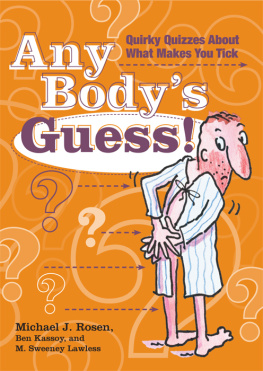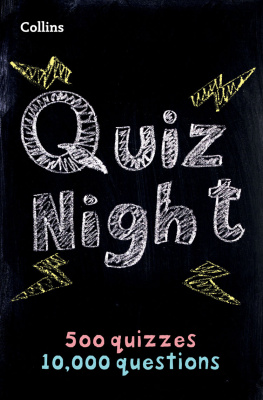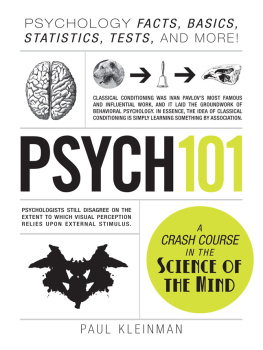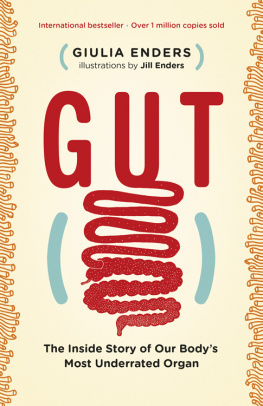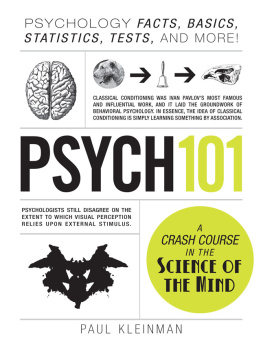

Any Bodys Guess! copyright 2010 by Michael J. Rosen. Illustrations 2010 by Michael J. Rosen. All rights reserved. No part of this book may be used or reproduced in any manner whatsoever without written permission except in the case of reprints in the context of reviews. For information, write Andrews McMeel Publishing, LLC, an Andrews McMeel Universal company, 1130 Walnut Street, Kansas City, Missouri 64106.
E-ISBN: 978-1-4494-0027-9
Library of Congress Control Number: 2009939470
www.andrewsmcmeel.com
Attention: Schools and Businesses
Andrews McMeel books are available at quantity discounts with bulk purchase for educational, business, or sales promotional use. For information, please write to: Special Sales Department, Andrews McMeel Publishing, LLC, 1130 Walnut Street, Kansas City, Missouri 64106.
Contents
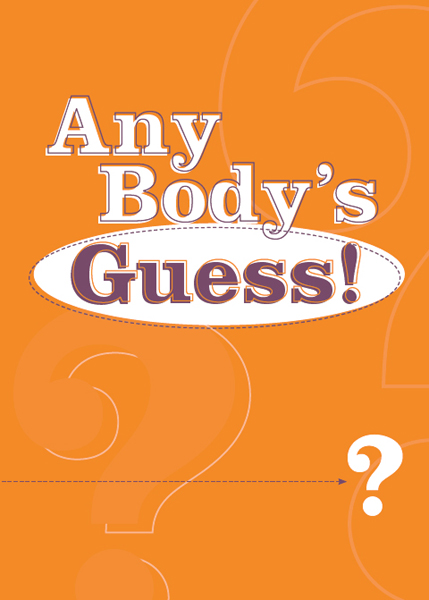
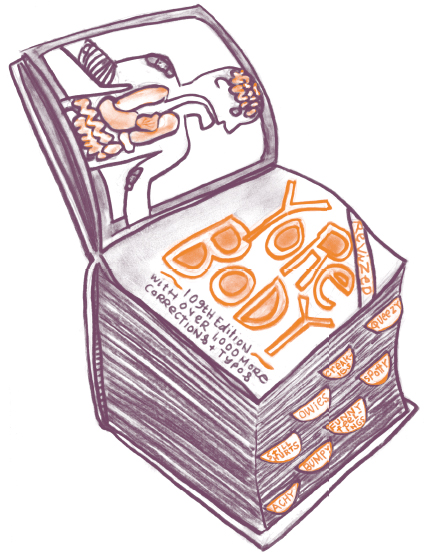
What Makes Us Tick,
Sick, and Thick
Your body doesnt have to be a scary thing. Youre natural. Youre normal. Youre an amazing machine! (Granted, your operating manual has been poorly translated.) So you have questions.
Okay then! We have answers... in the form of questions.
The wondrous mechanism you is a fine piece of workmanship that discipline, exercise, and a decent diet can turn into a Formula One race car that purrs like a cat, pounces like a tiger, and scarfs down gazelles and giraffes as if they were chicken nuggets.
In the pages that follow, we present age-old and modern befuddlements that will both wrack your brain and pull your leg (two of our favorite body parts), at least at first.
What makes us tick? Ever wondered how the parts of your body acquired their names (the scientific names, that is)? Whom should you kiss if you want to reduce the risk of getting into a car accident? What should you drink if you want to avoid cataract surgery?
Your body has more exotic locales than any country, so kick back for a little armchair travel.
What makes us sick? Does the idea of bedbugs gross you out? Do you know that lice dont think were so nice? Are you terrified of sharks but fond of honeybees?
Whether youre squeamish or curious, other creatures arent just creepy-crawliestheyve been our fellow passengers in life throughout the ages.
What makes us thick? Do you wonder about weight? Do you work hard to unwind? Do you worry about whether you worry too much?
Those extra pounds, those extra hours of overtime, and those extra stresses may be affecting you, your family, and the planet in some weird and surprising ways.
With this book of fascinating facts and flippant questions in hand, you can challenge your friends, captivate your carpool, and entertain yourself when the airline announces yet another update on your delayed flights status.
Go! Fight!
Whine!
A common problem that used to plague adults almost exclusively now afflicts teenagers, especially cheerleaders, linebackers, and divers (thats diving-board divers, not insane people who strap on parachutes and jump out of planes or who tempt sharks by swimming to the ocean floor). Whats the problem, and whats happening to our youth?
The Make-No-Bones-About-It Answer
A side from the fact that cheerleaders, linebackers, and divers all wear butt-hugging clothing, athletes in these sports are part of an expanding community of young people who suffer back injuries.
Aside from the common cold, lower back pain is responsible for the greatest number of sick days in the United States.
For jocks, jockettes, and Rockettes (yes, dancers also feel the pain), these strains and spasms result most often from overuse. (Coaches: Three-a-days should refer to meals, not workouts.) These days, adolescent back pain also stems from excess body weight, which puts extra pressure on the spine and back muscles, not to mention the living room recliner busted during the marathon video game session last Saturday night (inactivity leaves muscles flabby and weak).
Other things that cause your back to ache:
- Lugging around heavy backpacks (yes, metrosexuals, messenger bags count).
- Improper lifting (weights, girlfriends books, girlfriend).
- Poor posture (slouching is the traditional way for a teenager to express disaffection for the world at large, disdain for the mall, and, for girls, the desire to be shorter than her date).
- Tight hamstrings and weak abdominal muscles (turns out that video games, while building great thumb strength, dont do the same for the hammies and abs).
So what can you do? Stop browsing videos of police chases on YouTube, go for a jog, and try doing a few extra crunches instead of a few extra munches.
Although back pain is becoming increasingly common in young athletes and those with growth spurts between the ages of ten and fifteen, its generally benign and short-lived. So, young people, enjoy your cuteness while this acuteness lasts. Getting old is not childs play.
Dont Lose
Your Head
Over This
Question
According to fairly reliable historical sources, two renowned prisoners, Marie Antoinette (17551793) and Sir Thomas More (14781535), both experienced the same shocking thing the morning of their beheadings. Even if theres no such fate in your future, should you be worried?
The White-as-a-Sheet Answer
T he Queen of France was very fond of her elaborate hairstyling that some say resembled the diorama of a rainforest. On the execution scaffold, Thomas More supposedly moved his beard clear of the chopping block, proclaiming, It hath done no treason.
Alas, although these unfortunate icons were particular about their hair, history has it that both heads went suddenly and shockingly gray before they rolled.
Some say the intense anxiety and stress over their impending execution grayed Antoinette and More. What? Reigning as queen during the French Revolution or disrespecting Henry VIIIs new bride hadnt provided a sufficient dose of each?
As we age, hair pigment follicles (we call them melanocytesyou can call them whatever youd like) produce less pigment. As our hair falls out (on average, forty-five to sixty hairs each day), new hairs, with less melanin, are the replacements. Graduallyor suddenlyour heads sport an entirely different sort of gray matter.
In addition, an enzyme with the nifty name catalase starts to peter out as the decades pass, and the less catalase there is to break down naturally-accumulating hydrogen peroxide, the more color fades away. (Remember your days as a lifeguard at the city pool: H2O2 bleaches hair.)

A few unhealthy conditions can also cause premature graying, including vitamin B12 deficiency, thyroid disorder, smoking, or fear or stress. (Your definition of

